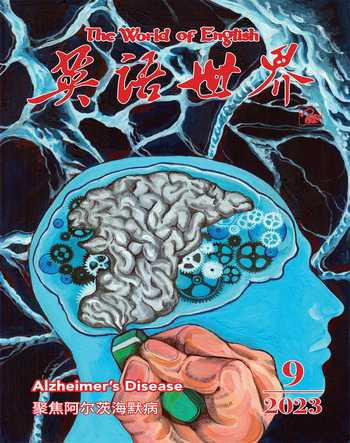In The Council of Animals, the Fate of Humanity Comes Down to a Vote《动物公会》:人类命运取决于投票
莉迪娅·米利特 左可飞/译
In my favorite childhood books, the animals always spoke. But in the books Ive read as an adult, the talking beasts have been replaced by human characters—equally made up, though often less charismatic. Still, I sorely miss those wise, anthropic creatures, so I was delighted to open Nick McDonells novel The Council of Animals and discover some friendly critters engaged in witty banter. Here, I thought, might be a fantastic hybrid of the childlike and the mature—as its publisher once described, a “Roald Dahl meets Animal Farm” classic to be savored by all ages.
在我最喜欢的童年书籍中,动物们总是会说话。但在我成年后读过的书中,会说话的野兽已经被人类角色所取代——虽然两种角色都是虚构出来的,但人类角色往往没什么魅力。我还是非常怀念那些睿智的拟人动物,因此我很高兴地翻开尼克·麦克唐奈的小说《动物公会》,发现里面一些友好的小动物们风趣的调侃。我想这可能是一个童趣与成熟的奇妙结合——正如出版商所描述,这是一部融合了“罗尔德·达尔与《动物农场》”的经典之作,值得所有年龄段的人品读。
The setup is this: A small group of familiar mammal species, including a cat, a dog, a horse and a bear—plus one delusional, hyper-religious crow whose intelligence, for a member of the ingenious corvid family, appears distinctly subpar—holds a meeting to decide the fate of humanity. Humans have recently been reduced, it turns out, from billions to a dozen in the wake of an event called “The Calamity”. Maybe that calamity was climate change, maybe a nuclear disaster; its cause is unclear and, at this point in history, hardly needs to be specified, since the disaster possibilities before us are so richly abundant. The animals in the council, well-schooled in the principles of “demoscratchy,” gather to vote on whether to kill and eat the last people or let them live.
故事是這样的:一小群我们熟悉的哺乳动物,包括一只猫、一条狗、一匹马和一头熊——外加一只有妄想症、极度虔诚的乌鸦(身为机灵的鸦科动物,它的智商明显低于一般水平)。动物们开了一次决定人类命运的会议。在一场名为“大灾难”的事件之后,人类的数量从几十亿人锐减到十几人。那场灾难可能是气候剧变,也可能是核事故;具体原因尚不清楚,在这个时代也不太需要讲清楚,因为摆在我们面前的灾难可能性实在不少。公会中的动物们受过“民主爪治”原则的良好教育,它们聚在一起投票表决是要杀掉并吃了最后的人类,还是留下他们的性命。
“The Council of Animals” is a hybrid tale for sure. It has the feel of a bedtime story spun to entertain, say, a niece or nephew, sprinkled with jokes based on animals bodies and sounds; but there are winks and nods for older readers in Easter eggs of punster humor throughout (“Woof Point,” for instance, is the name of a prestigious military academy for dogs, a reference not tailored to child readers). The cast of characters relies on animal stereotypes and hierarchies—sly, scheming cats and obedient dogs; fine mammals at the top and unpleasant insects like cockroaches at the bottom—in line with common notions a child might be handed by her elders about wildlife. In its shape, the novel resembles an O. Henry short story or a movie like “Planet of the Apes,” with an ironic, dramatic twist at the end thats not too surprising.
毋庸置疑,“动物公会”是一个混合故事。它给人们的感觉就像一个哄侄女或外甥的睡前故事,写满了关于动物身形和叫声的笑料;其中插入的双关幽默彩蛋也为年龄稍大读者们提供了暗示和意会(例如,“汪点军校”是一所著名的犬类军事学院,这个说法显然不是给儿童读者看的)。小说的角色塑造依靠人对动物的刻板印象和等级划分——狡猾、有心机的猫和顺从的狗;位于顶端的是讨人喜欢的哺乳动物,下层是让人讨厌的昆虫,比如蟑螂——这些都与孩子从长辈那里耳濡目染的、关于动物的一般观念相一致。从形式上看,该小说类似欧·亨利的短篇小说或《人猿星球》一类的电影,以讽刺性和戏剧性的转折结尾,这不太出乎意料。
Notably, in an era of large-scale, human-caused animal extinction, its the question of human salvation, not the destruction of the natural world, thats at the core of the plot. Animal forms and personalities are deployed as proxies for our own social and political factions and tendencies (following precedents from Aesop to Orwell, Richard Adamss Watership Down or even Karel Capeks brilliant War With the Newts). They are clowns performing a lightweight puppet show with conversational styling but a shockingly heavy subject. That tension is purposeful, of course—this is a satire of manners in which ponderous matters are treated as fodder for the equivalent of dinner-party badinage. (Though its the sort of dinner party where, in the course of an evening, one of the guests may rudely and suddenly gulp down another.)
值得注意的是,在人类造成动物大规模灭绝的时代,情节的核心在于拯救人类而不是自然的毁灭。动物的形态和性格特征被拿来代表我们自己社会政治派系和倾向(从伊索到奥威尔,到理查德·亚当斯的《沃特希普荒原》,甚至卡雷尔·恰佩克的大作《鲵鱼之乱》,都是先例)。这些动物就像小丑一样,演了一场轻松的木偶戏,用日常对话的形式来表现异常沉重的主题。当然,这种冲突是作者有意为之——这是对繁冗礼节的讽刺,枯燥乏味的事被当作晚宴上打趣的谈资。(尽管在这种晚宴上,一晚之间,一个客人可能会突然残暴地将另一个囫囵吞下)。
To child readers, this book might seem like all talk and no action, while to adult readers, it may seem too childlike, for The Council of Animals is a replicator, rather than an interrogator, of fixed ideas about animals subservience to people and their roles as human instruments. Its levity of tone can be read as gentle handling or glib reduction, depending on your taste. For some readers, the story may land as a playful pantomime, meant to be received in that spirit of fun and seasoned with a thoughtfulness thats broad but not too deep. But for those readers who may be discomfited by the casual use of animal figures as caricatures, and to those who, like me, are compelled by the subjectivity and uniqueness of other life-forms and are acutely anxious about their imminent peril at our hand, the book resonates more like a joke being told in the wake of an untimely death… and in the fleeting moments before the next death occurs.
對儿童读者来说,这本书像在纸上谈兵,而对成年读者来说,它又可能过于幼稚,因为《动物公会》重申而非质疑动物作为人类服从者和工具的固有观念。这本书中轻浮的基调可以被理解为作者温和的处理方式,或是油滑的大事化小,一切取决于你的喜好。对于某些读者来说,这个故事像一场诙谐的哑剧,用意是让人以娱乐精神来体验,再加入一些广泛而不太深入的思考。但是,对于那些因动物形象被随意用于夸张描写而感到不安的读者,以及像我一样被其他生命形式的主体性和独特性所折服,又对它们即将面临的人为危险深感焦虑的人来说,这本书引发的共鸣更像是在一次不期而至的死亡之后……在下一次死亡降临前的瞬间里讲的笑话。
As diversions for young readers, fiction has near-infinite license for silliness—to critique whimsical childrens literature straight-faced and primly feels foolish, like trying to scrutinize a prancing pink unicorn under a microscope. But since The Council of Animals has been likened to Orwell, though, the critical bar is set higher: McDonell—a journalist with a record of reporting on war and its casualties—clearly wishes to offer us more than childs fare alone.
作为年轻读者的消遣物,小说几乎有无穷无尽的理由使自己可笑——严肃正经、煞有介事地批判儿童文学异想天开是愚蠢的,就像试图用显微镜仔细观察一只奔跃的粉色独角兽。但自从《动物公会》和奥威尔相提并论后,批评的门槛就设得更高了:麦克唐奈——作为一名报道过战争及战争伤亡的记者——显然希望为我们提供除儿童故事以外更多的东西。
But through its inversion of the risks of current human activity—the conceit that human extinction, rather than the mass extinction of others, is the looming specter that haunts our kind—the novel enacts a kind of gamification of the tragedy of loss. This well-intentioned fable returns us once more to the arc of narcissism that has increasingly defined our dominant myths. Other animals and plants are being drastically, swiftly obliterated across the globe and may survive, in many cases, only in captivity or not at all as the coming decades unspool; but still people are the heroes, the villains and the victims in every epic. Why not? The world belongs to us.
然而通过对当前人类活动产生风险的反转——傲慢地认定是人类灭绝,而不是其他物种的大规模灭绝,像隐隐约约萦绕在我们身边的幽魂——这部小说以某种游戏化的方式演绎了灭绝的悲剧。这个善意的寓言再次将我们带回自恋的弧线,而自恋越来越多地定义了我们的主流神话。其他动植物正在全球范围内急速消失。在许多情况下,在未来几十年间,它们只能在人工圈养下生存,或是终将灭绝;但在每一部史诗中,人类仍然扮演着英雄、反派和受害者的形象。为什么不这样写呢?世界是我们的。
So, as thousands of species hover on the brink of extinction in our own backyard—only 10 little vaquita porpoises, the last of their kind in the world, remain in the Gulf of California, for instance—this story concerns itself with a fictional 12 last humans.
因此,当人类后花园中数以千计的物种徘徊在灭绝边缘时——例如,世界仅存的最后10只小鼠海豚还生活在加利福尼亚湾——这个故事却虚构世界上只剩下最后12个人类。
Certainly the threat of human extinction, in The Council of Animals, also serves as a metaphor for the disappearance of others—hence the symbolic role reversal. But if all signs point everywhere, why bother to post those signs at all?
當然,在《动物公会》中,人类灭绝的凶兆也是对其他物种消失的隐喻——因此,这是一种象征性的角色互换。然而,如果所有路标都指向四面八方,为什么还要费心设置这些路标呢?
——基于FPS游戏《穿越火线》战队公会的网络诈骗行为研究
——以FPS游戏《穿越火线》战队公会为例

